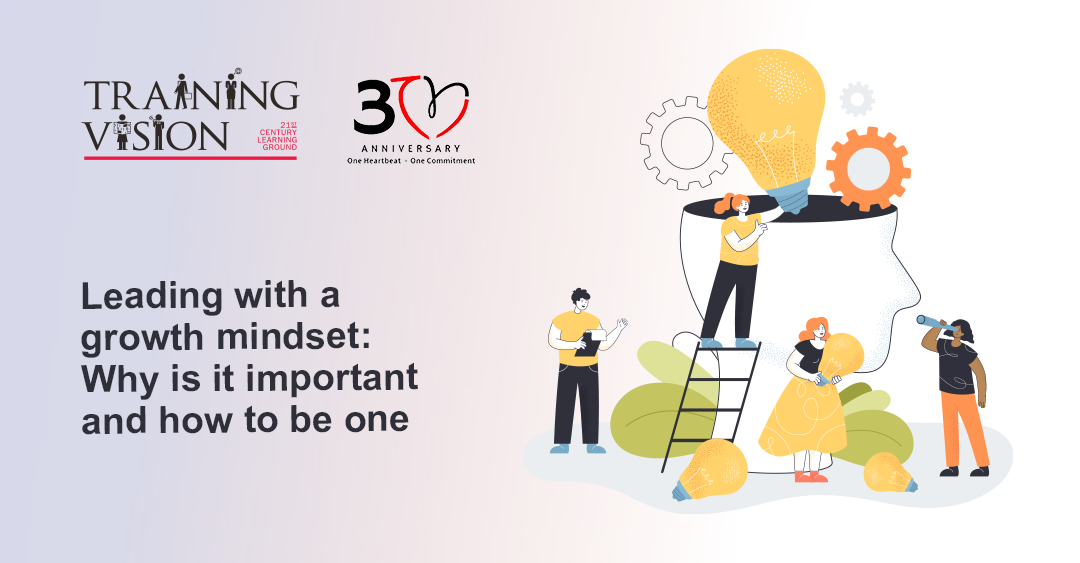Leadership is a concept that goes a long way back—and there have been many different definitions of what a good leader is supposed to be. Over the centuries, business leaders have struggled with various challenges brought by inevitable changes in the economy and the innovation of technology. With this being said, it should constantly be on their agenda to strategise and come up with plans that would allow them and their team members to stay focused and motivated despite the disruption. To be this kind of leader, one must have a growth mindset.
Fixed Mindset vs Growth Mindset
If leadership then and now has one prominent distinction, we could say that traditional leaders are more results-oriented. They live by the numbers. These business leaders look for basic qualities in their team members such as intelligence and talent—qualities that cannot be transformed and developed. Needless to say, they have a fixed mindset.
Leaders with a fixed mindset are way too focused on the results that when the target is not met, they easily get frustrated and think of it as a failure. They would tend to interpret it as a waste of time and without recognizing the opportunity to learn and grow. Leaders with a fixed mindset inevitably hurt not only the leadership itself but also the team that they lead. Some of the implications of fixed mindset leadership are:
- A culture of fear. Their teams are too scared to express ideas, take risks, and even innovate. Their fear is rooted in the notion that they might be seen as incompetent if they make mistakes in the process, or if they didn’t produce the desired result.
- A finger-pointing culture. When challenges are on the way—just like what happens in any organisation—the leader will think of this as a failure and look for a person or a team member to blame. This makes the entire time focused on keeping themselves safe instead of choosing to work together and grow as a team.
- An unmotivated team. Team members cannot maximise or even expand their full potential.
- Micromanagement. Micromanaging the team can often lead to the team members becoming stressed and overworked.
On the other hand, leaders with a growth mindset do the exact opposite. They are delighted to see their team members grow and expand their talents and create a culture of accountability.
Leaders with a growth mindset often see opportunities for their team members, even in times of crisis. The pandemic is a perfect example of a huge challenge that tested out their leadership skills to the extreme. As growth leaders, they saw this as an opportunity to grow, be proactive, and be accountable. Let’s talk about the implications of a growth leader:
- A culture of accountability. When there is no finger-pointing going on, the team members develop accountability and take ownership when challenges arise. They do not fear coming up with new ideas and experiments because to them, it is another learning opportunity.
- A team that is motivated and has the desire to grow. Team members are inspired to produce the best results, even beyond expectations because they know that it will be recognized and will give them growth opportunities.
- A team that is resilient enough to take on challenges. When the team members are always challenged and motivated to grow, they will become less susceptible when problems arise and they naturally develop an instinct for problem-solving instead of finger-pointing.
- Evolution of leadership, team, and company. The evolution of leadership is also important because a time may come when everything can still run smoothly without the leader—and it only means that they were able to train their team well. As the team works together to succeed, the organisation also evolves and will also succeed.
Why is growth mindset leadership important?
Some leaders may not agree with the idea of developing and adopting a growth mindset. They are still in the belief that talent and skills are permanent and there isn’t really a chance for people to change. Leaders with a fixed mindset can still be successful in some ways, but they tend to build a highly stressful culture in the workplace.
Digital transformation has proven this wrong—the disruption we all experienced during the pandemic and the solutions provided to us by digital technology are enough proof that people can develop and acquire other sets of skills. We need the ability to adapt, and it is imperative to develop this skill as fast as we can if we want to keep our jobs and stay relevant. This is just one of the many reasons why growth mindset leadership is important.
Let’s dive into some other reasons why you should have a growth mindset as a leader.
Change is inevitable. As the saying goes, nothing is constant in this world except change, and true enough, we have witnessed a lot of changes happen before our eyes, especially from the business perspective. It is a challenge to accept changes and forever forget your comfort zone, let alone adapt to a new environment. Although, if you have a growth mindset, transitions and changes are just going to be another day in your life as a leader. What’s more, it’ll also be easier for your team members to adapt as they can see it happening right from the top.
A motivated team means a productive one, too. You see—when your team is motivated and inspired, they are more likely to produce desirable results. They might come up with ways on how to make their work easier so they can perform more important tasks. They are not afraid to experiment and take risks because there are only two things they believe can happen: another learning and growth opportunity, or a successful project that benefits not only the team but the entire organisation.
You are building a healthy culture in the workplace. A great culture in the workplace is equally important. We want our team to feel excited, driven, and happy so that they won’t think twice about giving their best to the company. We want them to enjoy what they are doing at work. We want them to feel empowered and trusted. This might sound very ideal and employee-oriented but this is going to be a reflection of your brand identity in the long run. Happy employees mean happy customers, and indeed, a successful company desired by many.
A growth mindset expands possibilities for all. As a leader with a growth mindset, you become accountable for your own growth and evolution. This provides you with more opportunities not only as a leader but in other aspects of your career. The same thing goes for your team—they will find various opportunities for growth. This is a huge win for the company because as its people grow and succeed, it will also do so.
How to adopt and nurture a growth mindset
As we have talked about its importance, you might be wondering how are you going to train yourself to be an individual with a growth mindset. Of course, this mindset does not just apply to leaders, but also to those who aspire to become one in their respective careers and industries. Here’s how you can train yourself to adopt a growth mindset.
Embrace changes. We are in a world that’s rapidly changing, and the basic step toward growth is to accept the changes around you and adapt to them. Keep in mind that adapting to change is not just learning about the new tools or the latest technological advancement, it also means changing yourself, your team, and even the structure and systems of your company.
Practice self-awareness. For you to grow and change, it is essential to first understand your objectives. Assess yourself—what are your strengths, weaknesses, limitations, and even your emotional status. By knowing these things about yourself, you can equip yourself with the necessary learnings and explore opportunities. It will also help you in making sound decisions for your team and also for the entire organisation.
Be the game-changer. We all acknowledge the challenge that sudden changes bring. The good news is, that there is something we can do to combat this. Do not wait for the change to come, make the change yourself. Whether it is about technology, a new strategy, or a change in the system, be the one to create the change.
Disrupt yourself. Routines are great, but it is also a good thing to change your habits and disrupt yourself from time to time. Ask yourself what are the habits and practices in your life that need to be disrupted even a little bit. What are the strategies that used to work for you but now provide you with different outcomes? What can you do to focus your time, energy, and efforts on more important goals? The answers to these questions and the steps you are going to do about them are what will drive you to growth.
Appreciate and reward both learning and failure. When you are running a business, you are bound to fail. Having a growth mindset means learning from these failures and treating them as growth opportunities. It is essential that this can be seen by your team so that they are also motivated to push their boundaries and dare to experiment with innovative changes.
Nurturing a growth mindset is a continuous process. Your mindset is always a work in progress, and so is growth. Learning has no end, and therefore you should always make time to learn new things and encourage your team to do the same.
A growth mindset allows you to stay on top of the game, whether you are currently a leader or aspiring to be one. It provides you and your team the right confidence, as well as a competitive edge in your respective industry. If there are various leaders in your organisation, this is the time for you to change the old system and encourage them to adopt the modern leadership mindset.
If you want to acquire the skills of a modern leader, our Leadership and People Management course provides the exact tools you need to acquire the skills of a leader with a growth mindset. The course explores the essential facets of leadership and is designed to provide a leadership development roadmap that can help you keep up with the latest trends and practices which makes it perfect for you and the leaders of your organisation.
Click here to find out more about the course.
Need more materials about modern leadership? Listen to our podcast episode on Soft Skills for Leadership Success or read our blog on Becoming a Digital Leader to know more about the skills you need as a leader in the digital age.








